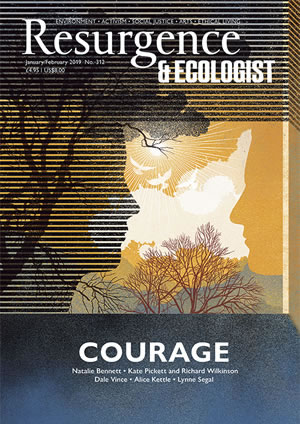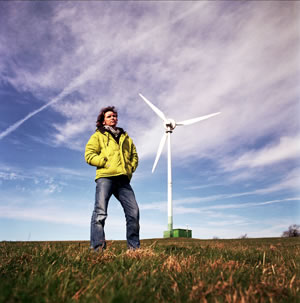Dale Vince describes himself as a “head-down-getting-stuff-done kind of person”. This approach has certainly achieved a lot so far. The company he founded in 1996, Ecotricity, regards itself as Britain’s greenest energy company, supplying over 200,000 customers across Britain from a growing fleet of wind and sun parks. Ecotricity has electric vehicle charge points in motorway service stations across the UK and funds what it describes as the world’s first vegan football team. Ecotricity’s electricity supply has been 100% green (as opposed to a mixture of green and ‘dirty’ energy) since 2013.
I spoke to Vince in the week that the UN Intergovernmental Panel on Climate Change (IPCC) released its special report on climate change stating we have 12 years to keep global warming to a maximum of 1.5°C. To achieve a fall in CO2 emissions to net zero, coal will need to be largely phased out by mid-century and renewables will have to meet the majority of future electricity supplies. It’s a pretty good recommendation for green energy suppliers like Ecotricity, but to achieve it requires political will.
“The current [UK] government and the previous government under David Cameron have been pulling us in the total opposite direction, shutting down the onshore wind and solar industries and promoting fracking for all it’s worth, when in fact we can’t afford to burn the fossil fuel reserves we know of,” said Vince. “We certainly don’t need to find more.”
Ecotricity provides “frack-free” green gas and has set up a People Power Fund to support activists on the front line. At the time of our interview, three men were facing jail terms for causing a “public nuisance” after taking part in an anti-fracking protest. They were later freed on appeal.
As an alternative to fracking, in 2016 Ecotricity launched its Green Gas initiative, which involves anaerobic digesters breaking down grass to produce biogas by “cropping marginal land for its grass three times a year, creating great nature habitats in the process”. A typical 5MW Green Gasmill will require about 3,000 acres of grassland to supply 3,500 homes with all the gas they need, according to the company. “We haven’t built one yet, but we’ve got planning permission and we’re hoping to start one before very long,” Vince said.
Transport is another frontier. Private electric vehicle ownership has increased a lot since the Nemesis – built by Ecotricity engineers – became the fastest electric vehicle in the UK in 2012. Even so, we are still in the very early days of electric car adoption, according to Vince. Again, the UK government seems to be dragging its feet on pushing for change, scrapping grants to buy low-emissions vehicles just months after publishing its Road to Zero strategy. Nevertheless, Vince is optimistic. “I think we’re heading up an exponential curve actually and next year will see a big uptake as a whole raft of new models come on the market from the major manufacturers, with ranges of 300km [and] that can charge in about 20 minutes.” Ecotricity has certainly been at the forefront of developments. It provides more than 300 charging points for electric cars. It has not, however, invested in public transport.
Diet is also a big theme for the company. Vince himself has been vegan for “three or four decades”. This year the company announced accreditation from The Vegan Society. “It began with a story about dead fish in fish farms in Scotland being used by [Scottish energy company] SSE. We dug further and found slurry in pig farms and abattoir waste [being used in anaerobic digesters].” This, he said, affected millions of people. “We knew the use of slurry went on, but the extent of it was a surprise.” As a response, the company audited its supply chain to make sure it was free of these ingredients, instead using ingredients like vegetable waste, maize and grass, and in July announced the ‘world’s first’ vegan tariff.
In response, the anaerobic digestion industry said the process was there to make the best of agricultural and other organic wastes, not to cause them in the first place. “In an ideal world, there would be no need for our industry,” said Charlotte Morton, chief executive of the Anaerobic Digestion and Bioresources Association. “But where these wastes are produced – and they are, in huge quantities – it’s critical that they are recycled through anaerobic digestion, which gets by far the most out of them compared to other waste treatment technologies, into renewable energy and soil-restoring biofertiliser rather than left wasted and untreated to release climate-change-inducing methane into the atmosphere.”
Vince said the response from the industry had been “kind of a lame defence”.
“The intensive farming of animals is an abomination and the conditions they are kept in is appalling,” he said. “It’s also having a huge impact on the environment. So they were defending something that I think is indefensible, saying we produce all this slurry so we’ve got to do something with it, when we say don’t produce it in the first place.”
Facing the realities of climate breakdown is terrifying, so I ask Vince how he stays upbeat and motivated. “I don’t let stuff get me down,” he said. “There are too many things to do, too many battles to fight.” In the challenging months ahead, the world will need much more of this positive energy.
You can listen to the interview as a Resurgence Voices podcast.
Marianne Brown is Deputy Editor of Resurgence & Ecologist.








